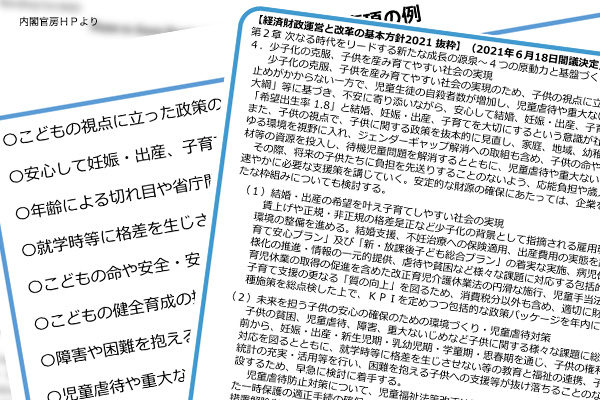The ruling Japanese Liberal Democratic Party is preparing for establishing a Children’s Agency and a basic children law. A panel of experts created by the government will compile recommendations by the end of the year. Relevant legislation including a bill to establish the agency will be submitted to Parliament during its ordinary session next year. I would like to point out some problems that have failed to be discussed sufficiently.
Neglecting “family” is unjustifiable
The first problem is about the name of the new agency. According to an official website for LDP House of Councilors member Taro Yamada, the originally proposed Children and Family Agency has been changed into the Children’s Agency because an expert who had ever been abused by family members noted that the name including “family” could hurt children abused by family members and should be changed. It is indiscreet to delete “family” for such unjust reason because family plays a key role in shaping children’s character. The name of the agency should be reconsidered.
Second, Japan should take into account the United States’ refusal to ratify the Convention on the Rights of the Child (CRC) for the reason that the full admission of the child’s autonomy rights could hurt the child’s right to protection, parental authority and family rights, as well as former West Germany’s reservation about the child’s right to protection in ratifying the convention.
Third, Swiss psychologist Jean Piaget known for his commentary on the Universal Declaration of Human Rights pointed out that while children shift to the autonomy stage from the heteronomy stage for educational guidance, educational consideration meeting development stages and the guarantee of the full development of mental functions and the acquisition of moral values would bring about respect for human rights and the full formation of character.
Given a sharp increase in the number of elementary school violence in recent years, organized guidance including teachers’ disciplinary actions is indispensable. Based on the logic of education to give educational consideration meeting children’s development stages and guide the shift from heteronomy to autonomy in line with such stages, we should discuss both respect for children’s human rights and the formation of their character.
Fourth, the proposal for the Children’s Agency and the basic children law is based on recommendations from the United Nations Committee on the Rights of the Child, which conducted preliminary examination based on a report from leftist nongovernment organizations in Japan behind closed doors, prepared a questionnaire to the Japanese government and received additional information from the NGOs in light of the government’s response to the questionnaire, before examining officially Japanese conditions. This means that the committee’s recommendations to Japan strongly reflect the leftist groups’ unilateral assertions. This reminds us that leftist groups took advantage of U.N. recommendations to exert pressure on the Japanese government over the comfort women and other issues.
Character formation is in children’s interest
We need a deep insight to find out what is in children’s best interest. We must remember that the denial of immediate benefits and the formation of character that enables self-control lead to the best interest of children. In light of problems regarding discussions accumulated by the Association of Children’s Human Rights affiliated with the Japan Teachers’ Union, the International Movement against All Forms of Discrimination and Racism led by the Buraku Liberal League, and the Committee for NGO Reporting on the CRC through its visits to the United Nations for over 30 years, I hope the government’s panel of experts will hold cool and balanced discussions.
Shiro Takahashi is an education specialist and a visiting professor at Reitaku University Graduate School. He is also a director of the Japan Institute for National Fundamentals.


